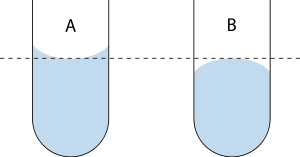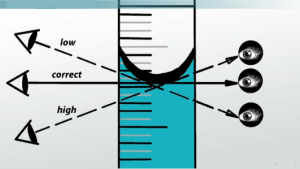During lab experiments especially in chemistry, we are always told to take a reading at bottom of the meniscus for colourless liquids and the upper meniscus of coloured liquids. A student while performing various experiments sometimes gets confused which meniscus to use when. Without knowing the reason why it is mandated thus, it sometimes becomes very confusing.
Before we begin our discussions on this, let us understand what we mean by the Meniscus.
The free surface of a liquid called meniscus, assumes a flat, convex or concave shape, depending on the solid and liquid surface. The meniscus is the curve in the upper surface of a liquid close to the surface of the container or another object, caused by surface tension. It can either be convex or concave, depending on the liquid and the surface.
 A convex meniscus occurs when the particles in the liquid have a stronger attraction to each other (cohesion) than to the material of the container (adhesion). A convex meniscus occurs, for example, between Mercury and glass in barometers and thermometers. Conversely, a concave meniscus occurs when the particles of the liquid are more strongly attracted to the container than to each other, causing the liquid to climb the walls of the container. This occurs between water and glass.
A convex meniscus occurs when the particles in the liquid have a stronger attraction to each other (cohesion) than to the material of the container (adhesion). A convex meniscus occurs, for example, between Mercury and glass in barometers and thermometers. Conversely, a concave meniscus occurs when the particles of the liquid are more strongly attracted to the container than to each other, causing the liquid to climb the walls of the container. This occurs between water and glass.
In the above figure,
A: The bottom of a concave meniscus.
B: The top of a convex meniscus.
Now coming back to the original question, why should we record the reading at the lower meniscus of colourless liquid and at the upper meniscus of coloured liquid?
In the case of colourless liquid, it is easy to observe the phase boundary, whether it is convex or concave hence in the colourless liquid lower meniscus may be considered. A meniscus is the curvature of the surface of the water. Water "sticks" to the walls of the graduated cylinder, but only on the sides and not the middle. When students look at the surface, the water level is not straight. Measurement should be therefore done at the lowest point.
However, in the case of coloured liquids observing this phase boundary (spatial interface, called a phase boundary) is not possible, hence only the upper meniscus is considered.
Why is it necessary to read the meniscus at eye level?
 During the measurements, students are supposed to observe or note the meniscus reading from eye level because viewing from either above or below the eye level can render the reading inaccurate. Hence, in order to get an accurate reading, students need to read the meniscus at eye level.
During the measurements, students are supposed to observe or note the meniscus reading from eye level because viewing from either above or below the eye level can render the reading inaccurate. Hence, in order to get an accurate reading, students need to read the meniscus at eye level.
When you perform an experiment in the lab, it is always better to know the fact and reason of every experiment procedure that is adopted.

This is really useful, thanks.
Thanks for your expression of interest. Please share your inputs/suggestions on connect@zigya.com for the relevant team members to look into it with all the details.
Hi there! This is my first visit to your blog! We are a
collection of volunteers and starting a new initiative in a community in the same niche.
Your blog provided us useful information to work on. You have done a outstanding job!
Somebody necessarily help to make severely articles
I might state. That is the very first time I frequented
your web page and up to now? I amazed with the research you made to
make this actual publish amazing. Wonderful job!
This is really helpful, thanks.
It works quite well for me
I am two decades old and interested in beginning a blog, but I’m not sure exactly where I should (what site) or how to start. I have so many interests(fashion, politics, soccer, acting, etc) so I’d prefer a journal like blog that I may write about anything and everything. Please weigh in..